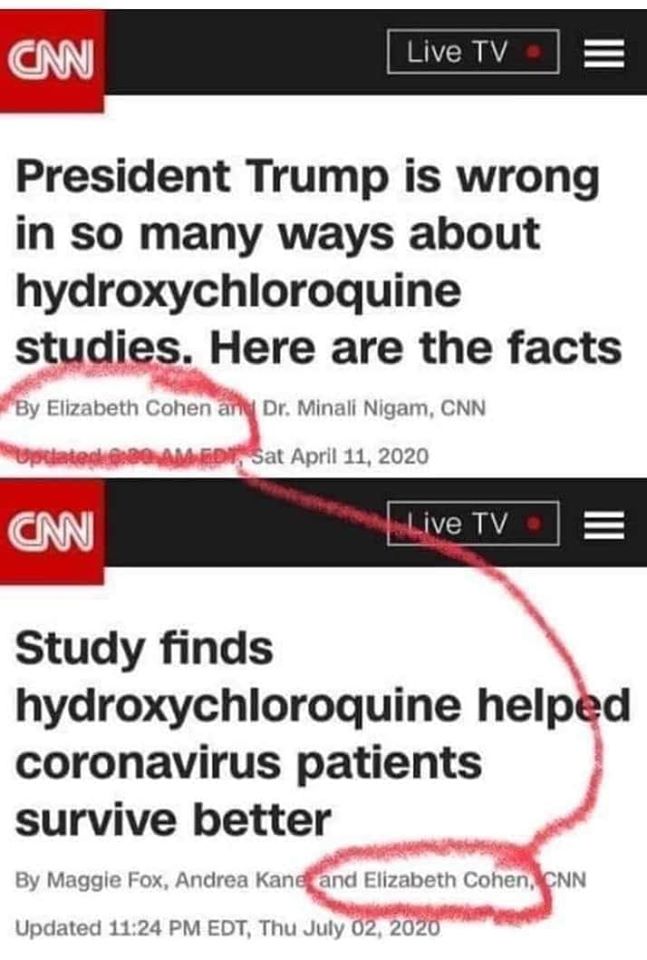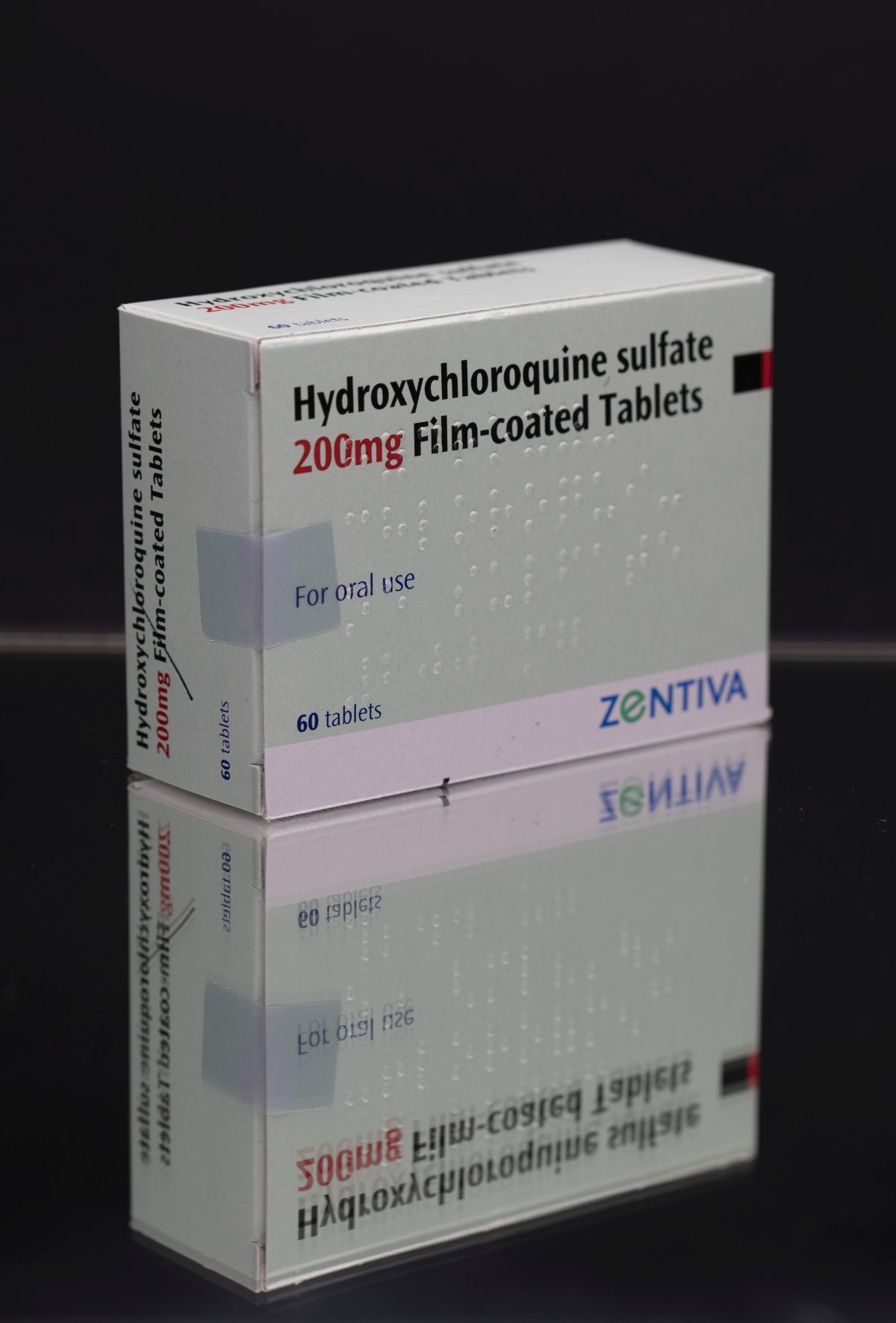One of the many political controversies surrounding the COVID-19 pandemic of 2020 was U.S. President Donald Trump's repeated touting of the malaria drug hydroxychloroquine for treatment of the coronavirus disease, despite a lack of scientific studies and evidence demonstrating its effectiveness for that purpose.
One item that circulated on social media played on that controversy by purporting to show two seemingly contradictory CNN articles about hydroxychloroquine, published three months apart and co-authored by the same person. One criticized Trump for being "wrong" about hydroxychloroquine, and the other acknowledged that a study had found hydroxychloroquine helpful in treating coronavirus patients:

However, these articles were not contradictory in content, and they were presented in a misleading manner in the above example to make them seem so.
The first article, published on April 11, 2020, and written by Elizabeth Cohen and Dr. Minali Nigam, was headlined "President Trump is wrong in so many ways about hydroxychloroquine studies. Here are the facts." This article did not assert that hydroxychloroquine had no value whatsoever as a treatment for the coronavirus disease. Rather, it pointed out four specific ways in which Trump had made claims about hydroxychloroquine studies that were contrary to what doctors were expressing about the subject at the time:
1) How soon until we know if hydroxychloroquine works against coronavirus? Trump says "days." Doctors say weeks or months.
2) French researchers have already done a clinical study showing hydroxychloroquine works as a treatment for coronavirus. Doesn't that tell us something? Trump says yes. Doctors say the study was terrible, so no.
3) Have some people tried to delay hydroxychloroquine clinical trials? Trump says yes, and he came to the rescue. Doctors say they have no idea what he's talking about.
4) Is hydroxychloroquine safe for coronavirus patients? Trump says yes. Doctors say the drug can have serious side effects.
The second article, published on July 3 2020, and written by Maggie Fox, Andrea Kane, and Elizabeth Cohen, had its headline deceptively truncated in the above example to remove the skepticism it expressed about a recent hydroxychloroquine study. The full headline read "Study finds hydroxychloroquine may have boosted survival, but other researchers have doubts," and the text of the article detailed the dispute over the study's findings:
A surprising new study found the controversial antimalarial drug hydroxychloroquine helped patients better survive in the hospital. But the findings, like the federal government's use of the drug itself, were disputed.
A team at Henry Ford Health System in southeast Michigan said their study of 2,541 hospitalized patients found that those given hydroxychloroquine were much less likely to die.
t's a surprising finding because several other studies have found no benefit from hydroxychloroquine, a drug originally developed to treat and prevent malaria. President Donald Trump touted the drug heavily, but later studies found not only did patients not do better if they got the drug, they were more likely to suffer cardiac side effects.
Researchers not involved in the Henry Ford study pointed out it wasn't of the same quality of the studies showing hydroxychloroquine did not help patients, and said other treatments, such as the use of the steroid dexamethasone, might have accounted for the better survival of some patients ... They noted that the Henry Ford team did not randomly treat patients but selected them for various treatments based on certain criteria.
[Eli Rosenberg, associate professor of epidemiology at the University at Albany School of Public Health] also pointed out that the Detroit paper excluded 267 patients -- nearly 10% of the study population -- who had not yet been discharged from the hospital.
He said this might have skewed the results to make hydroxychloroquine look better than it really was. Those patients might have still been in the hospital because they were very sick, and if they died, excluding them from the study made hydroxychloroquine look like more of a lifesaver than it really was.
"There's a little bit of loosey-goosiness here in all this," he told CNN.
Other analyst likewise found the hydroxychloroquine study referenced by CNN to be dubious, for similar reasons:
The study that sparked the latest controversy was anything but randomized. Not only was it not randomized, outside experts noted, but patients who received hydroxychloroquine were also more likely to get steroids, which appear to help very sick patients with Covid-19. That is likely to have influenced the central finding of the Henry Ford study: that death rates were 50% lower among patients in hospitals treated with hydroxychloroquine.
Evidence that hydroxychloroquine does not help hospitalized patients — the use in its original emergency use authorization, which was designed to allow doctors to access a national stockpile of the drug — is mounting.
Said [Steven Nissen, a cardiologist at the Cleveland Clinic and a longtime clinical trialist]: “The sooner we stop talking about hydroxychloroquine, the sooner we can focus attention on more promising therapies.”
In short, information about hydroxychloroquine as a treatment for the COVID-19 coronavirus disease, published by CNN in two articles in April and July of 2020, was neither contradictory nor inaccurate — despite deceptive attempts to make it look that way.

